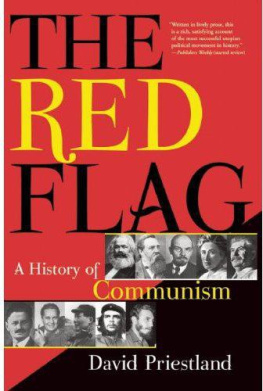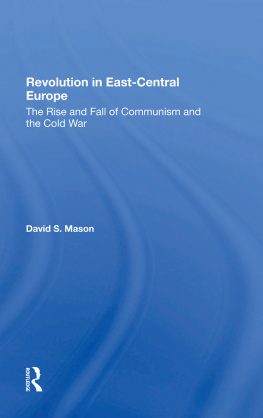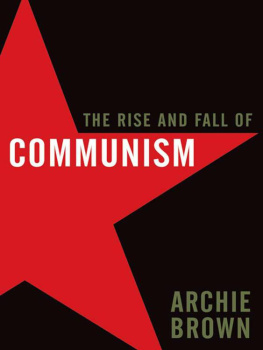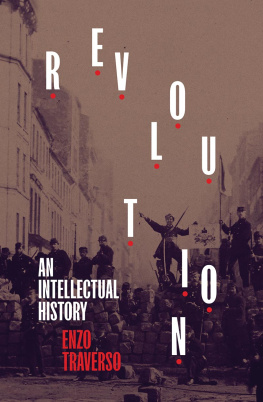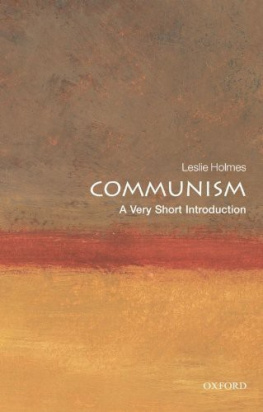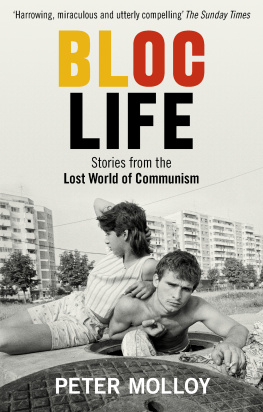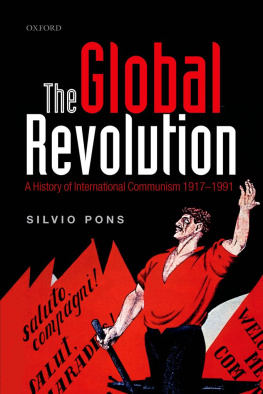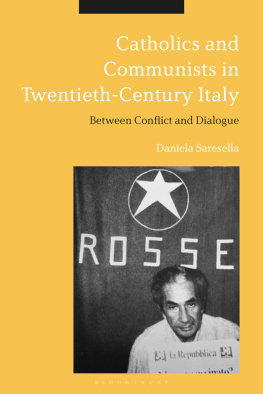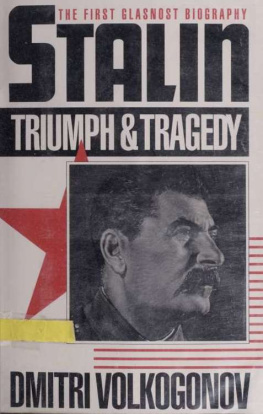Photographic acknowledgements are given in parentheses.
Acknowledgements
Writing global history is a challenge, but I have benefited from the enormous amount of exciting new scholarship published in the last twenty years, much of it based on newly available archival sources. I am also extemely grateful to a number of friends and colleagues who have given me advice and helped me avoid errors. Tom Buchanan, Martin Conway, Mary McAuley, Rory Macleod, Rana Mitter, Mark Pittaway and Stephen Whitefield all read substantial parts of the manuscript; Steve Smith was especially generous with his time and read nearly all of it. Ron Suny has shown me unpublished work on Stalin, Steve Heder shared material on the Khmer Rouge and Laurence Whitehead gave me advice on Cuba. The Cambridge History of the Cold War project, led by Mel Leffler and Arne Westad, was an ideal group in which to discuss the international role of Communism.
The fellows of St Edmund Hall and the History Faculty of Oxford University have provided me with a stimulating and congenial working environment and granted me periods of study leave to work on the book. I am also grateful to the British Academy and the Chinese Academy of Social Sciences (both in Shanghai and the Institute of Marxism-Leninism and Mao Zedong Thought in Beijing) for arranging a fruitful study trip to China; to Shio Yun Kan for his brilliant Chinese-language teaching; and to the archivists and librarians at the Russian State Archive for Socio-Political History in Moscow, the Bodleian Library, Oxford, the British Library, and the Russian State Library in Moscow.
Gill Coleridge was an ideal agent, and played a major role in the project from the very beginning; I am very grateful to her for her encouragement and advice. I have also been very fortunate in my publishers. Simon Winder at Penguin was an extremely incisive and impressively knowledgeable editor. Morgan Entrekin at Grove Atlantic was also very supportive, as was Stuart Proffitt at Penguin, and both gave me invaluable comments on the text. I would also like to thank Jofie Ferrari-Adler and Amy Hundley at Grove Atlantic. Thomass Rathnow at Siedler, and Alice Dawson, Richard Duguid and Mari Yamazaki at Penguin. Charlotte Ridings was an extremely effective and patient copy-editor and Amanda Russells extensive knowledge of the visual sources was a great help with the illustrations.
My greatest thanks go to Maria Misra, who made an enormous contribution to the book. Her knowledge of Asian and African history helped me to range far more widely than I otherwise would have done, and she read the whole manuscript, saving the reader from a good deal of clumsy prose.
NOTE ON TRANSLATION
Russian transliteration accords with the Library of Congress system (while suppressing soft and hard signs) except for a few well-known proper names (such as Trotsky and Yeltsin); similarly, Chinese transliteration generally follows the pinyin system, except for a few well-known names (such as Chiang Kaishek).
Introduction
178918891989
I
In November 1989 the Berlin Wall the concrete and graffiti-daubed symbol of division between the Communist East and the capitalist West was breached; joyful demonstrators from both sides danced and clambered on the wreckage of Europes ideological wars. Earlier that year Communism had been dealt another blow by popular protests (though on that occasion brutally suppressed) in Beijings Tiananmen Square. And so, exactly a century after the ascendancy of organized international Communism was marked by the foundation of the Second International of Communist parties, and two hundred years after the Parisian populace had stormed another symbol of authoritarian order the Bastille revolution had again erupted in the worlds capitals. These new revolutions, however, were aimed not at toppling the bastions of traditional wealth and aristocratic privilege, but at destroying states supposedly dedicated to the cause of the poor and oppressed. The dramatic, and largely unpredicted, fall of Communism in 1989 was, then, much more than the collapse of an empire: it was the end of a two-century-long epoch, in which first European and then world politics was powerfully affected by a visionary conception of modern society, in which the wretched of the earth would create a society founded on harmony and equality.
For many, Communism could now be consigned to Trotskys rubbish-heap of history a hopeless detour into a cul-de-sac, an awful mistake. The American academic Francis Fukuyamas claim that history, or the struggle between ideological systems, had ended with the victory of liberal capitalism was greeted with much scepticism, but deep down, many believed it.way to resolve social conflict, and capitalism was the only economic system that worked. And for some time, the world seemed to lose interest in Communism. It seemed to be a fading set of sadly fossilized attitudes surviving amongst a generation that would soon be crushed by the forces of reform. It was a phenomenon best left to dry scholarship, an ancient civilization akin perhaps to the Ancient Persians, with its own Ozymandian wreckage reminding us of past delusions. In the mid-1980s, when I began to research Communism, at the height of Cold War tensions, it seemed an exciting subject, but within a decade it seemed irrelevant in a new world of triumphant liberal capitalism.
However, two events in this decade have brought Communism back to the foreground of public attention. The first the destruction of New Yorks twin towers on 11 September 2001 had no direct connection with Communism at all. Indeed, the Islamist terrorists responsible were militantly anti-Marxist. Nevertheless, the Islamists, like the Communists, were a group of angry radicals who believed they were fighting against Western imperialism, and parallels were soon being drawn, by politicians, journalists and historians. Though the term Islamofascism was more commonly used than Islamocommunism, Islamism has been widely depicted as the latest manifestation of totalitarianism a violent, anti-liberal and fanatical family of ideologies that includes both fascism and Communism. For American neo-conservatives, these threats demanded an ideological and military struggle every bit as determined as the one Ronald Reagan waged against Communism in the Third World. In 2004 the European Parliaments centre-right parties sought to condemn Communism as a movement on a par with fascism, whilst in June 2007 President George W. Bush dedicated a memorial to the victims of Communism in Washington DC.

